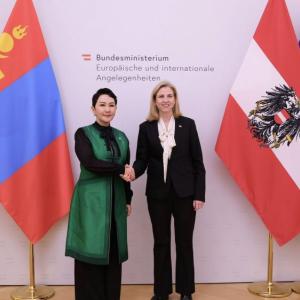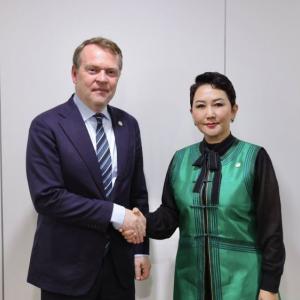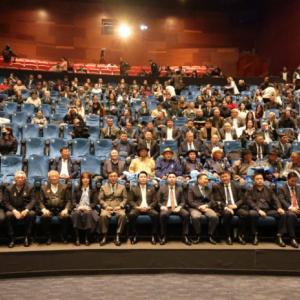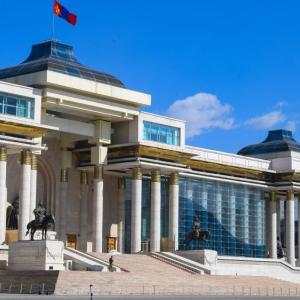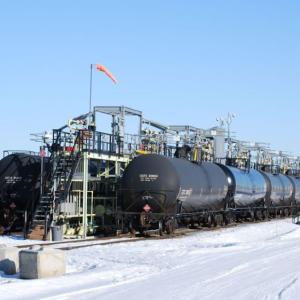B. Bayardavaa: Increase In the Budget Expenditure Has a Risk of Weakening the Effect of Monetary Policy
Economy
Ulaanbaatar /MONTSAME/. The
following is the interview with Director of the Monetary Policy Department of
the Bank of Mongolia B. Bayardavaa.
Last month, the State Great Khural discussed and approved the 2023
State budget. For the coming year, when the economy tends to be difficult due
to external and internal factors, how well do you think the budget policy was coordinated
with the monetary policy developed by the Bank of Mongolia? Specifically, can
fiscal policy play an important role in stabilizing the economy and supporting
monetary policy?
- The cause for the problem is that our economy, which had not recovered from the adverse effects of the COVID-19 pandemic, was hit by China's "Zero-Covid" policy and the tense geopolitical climate that has existed since the beginning of this year. As a result, there is a net deficit in the flow of foreign exchange, which makes it difficult to meet the foreign exchange demand for domestic activity. Or to put it another way, there was a balance of payments issue. However, if the root of the issue is not fixed, internal activity needs to be adjusted in order to maintain the outward balance. Budget expenditures for the upcoming year will total MNT 20.5 trillion or 38 percent of GDP, according to the approved figures. Increased budget expenditure has a risk of improving domestic demand, promoting imports, increasing exchange rate pressure, decreasing external solvency, accelerating inflation, and lessening the impact of tighter monetary policy. At the same time, the balanced budget revenue of MNT 19 trillion, or about 35% of GDP, is at risk when the external environment deteriorates. If the budget revenue falls short of the approved amount, the budget deficit may be higher than expected, and there may be a problem with financing the related deficit. This will have a negative impact on the sources of financing needed by the business.
It is crucial to reduce the flow of foreign currency out of the
country and encourage foreign direct investment at a time when Mongolia's GDP
is falling. It is understood that the monetary policy pays particular attention
to this and reflects it. Could you elaborate on this?
The main direction of the monetary policy for the upcoming year will define the targets of the budget, monetary, and financial policies. These targets will be implemented in cooperation with the government and the Financial Regulatory Committee in order to prevent the major risks that may arise in the economy in the upcoming year. The most significant of these objectives—increasing international payment capacity—includes three key objectives that have been defined. In addition to short-term steps that can be taken to tighten policies to limit outflows, efforts to boost inflows and increase non-mining export revenue are also included. In addition, it is necessary for policymakers to focus on increasing the sources of external financing, support the private sector and cooperate with international organizations in this direction. Negotiations have started with international organizations in this area.
At this time of the year, the majority of the private sector develops
its business plans for the next year. The policy rate for the upcoming year is
one of their key concerns. How much is the anticipated future increase in interest
rates? What other measures are planned to be taken without tightening the
monetary policy?
Monetary policy alone cannot stabilize the economy, and if it tries to do so, it will put a lot of pressure on the private sector. Trends in inflation and economic growth are taken into consideration while making monetary policy decisions. Our economic activity takes into account factors such as the external and internal environment, future conditions, such as banking and financial situation, fiscal policy, export, and import demand and prices, foreign interest rates, etc. Recently, the international relations situation has become a big consideration. We all know that fighting the inflation caused by the supply of goods and imports by increasing the monetary policy interest rate has the negative effect of reducing economic growth. However, since there is a risk of price increases covering many goods and products, we have no choice but to tighten the policy in order to prevent them from escalating in the medium term. According to the Bank of Mongolia, inflation is expected to reach single digits next year, but it is higher than the target. Also, there is still a need to stabilize inflation expectations and protect the MNT yield in the current situation of rising foreign interest rates, widening balance of payments deficits, and high budget expenditures. On the other hand, the rapid tightening of credit and financing conditions is constantly taking into account the risk of increasing the debt burden of entrepreneurs, limiting their ability to attract credit and financing, and thus shrinking economic activity and worsening growth.
The high inflation rate is the most pressing problem for citizens. The
nationwide inflation rate was 14.5 percent in October. In 2023, what risks
(external and internal) do you think will be the biggest obstacles to bringing
inflation to the target level (6+/-2) proposed by the Bank of Mongolia?
Inflation reduces real income and
weakens business activity. Price increases are spreading across the globe, and
many countries are experiencing high levels of inflation not seen in decades.
This situation is also manifested in our country, and the inflation target is
exceeded. According to the data of the National Statistics Committee, inflation
has been on a downward trend in recent months and reached 13%, but due to the
increase in flour prices in October-November, it rose back to 14.5%. However,
this is down 2.4 points from the June peak. In the future, the liberalization
of electricity prices will also affect inflation. Since more than half of the
total inflation in our country is directly affected by factors such as
transportation costs, transportation delays, supply failures, and the increase
in the price of imported goods, it is very important to reduce inflation in
trading partner countries. As of the last quarter, some economies have shown
signs of a decrease in inflation, a decrease in transportation costs, and a
decrease in transportation breakdowns, which supports the strict policy of
reducing inflation. As a result, inflation is expected to reach the target
range of the central bank at the end of next year and at the beginning of 2024,
but the above-mentioned factors such as the effects of monetary policy,
transport and its costs, supply and demand, fuel prices, wage growth, budget
expenditures, and exchange rates, etc. depend on many other factors.
Coal exports have increased in the last two months, and people
demonstrated against the zero-covid policy. What effect can all this have on
the upcoming monetary policy meeting of the Bank of Mongolia?
Export of coal, which was
stagnant in the first half of this year, has intensified since July, and as of
the first 11 months of the year, 27 million tons of coal have been exported. Of
course, the good volume of coal exports is a big boost to foreign exchange
inflows, but it is still not enough to cover the current account deficit. Also,
how much coal income is actually coming in is an important issue. The
difference between customs data and balance of payments data is about USD 2 billion.
In other words, such amount of foreign currency and coal income used in the
domestic economy is being spent on other things, which is the cause of
fluctuations in the economy and the exchange rate. Although China is expected
to start easing the Zero-Covid policy, the number of COVID-19 cases in the
country is constantly increasing, and the capacity of the health sector is a
major challenge. Taking these into account, international experts predict that
there will be no sudden changes in the "Zero-Covid" policy in the
near future. In short, neither our country's balance of payments nor our
southern neighbor's "Zero-Covid" policy will undergo major
adjustments in the near future, so we believe that these factors will not
affect the decision of the Monetary Policy Committee this month.
 Ulaanbaatar
Ulaanbaatar























